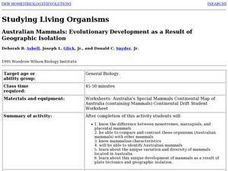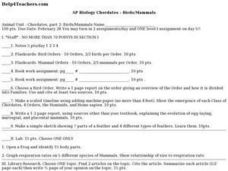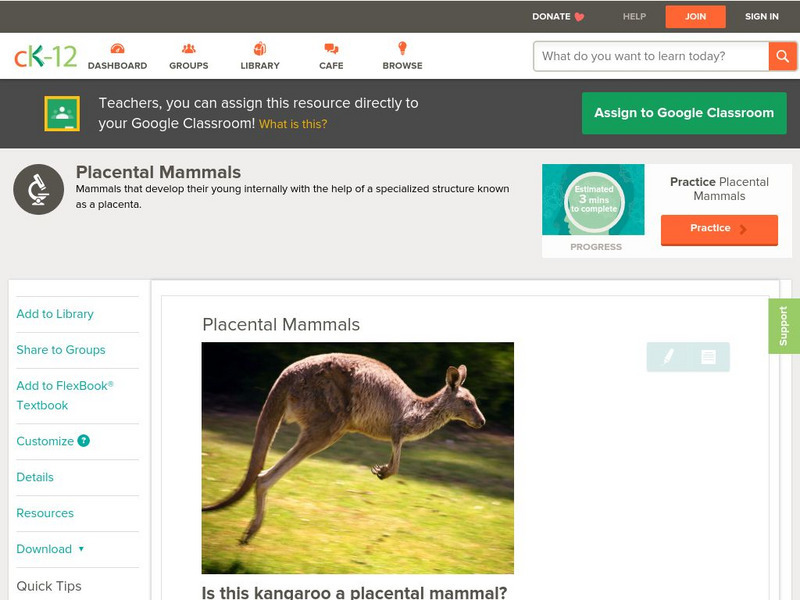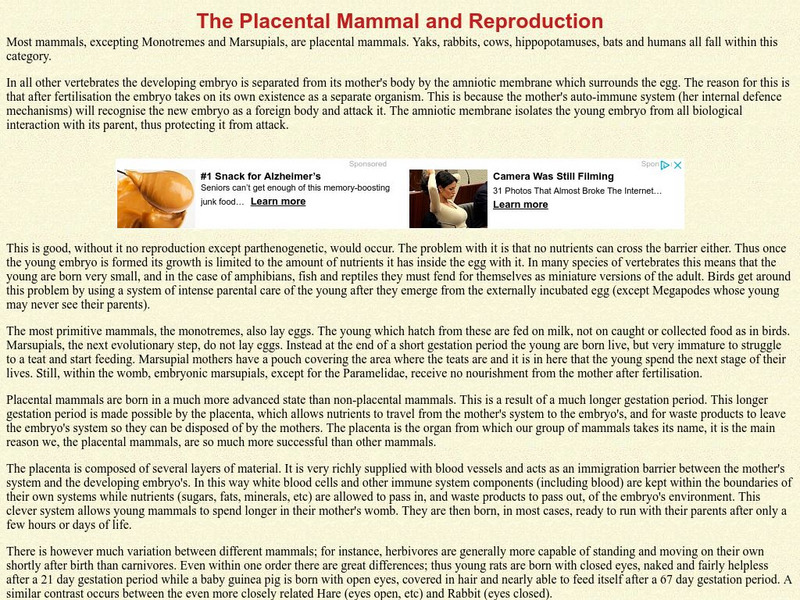Curated OER
Birds and Mammals
Providing a higher-level thinking experience, this presentation provides an in-depth and interesting review of mammals. The terms used in the presentation give students a chance to be exposed to scientific classifications. There is also...
Biology Junction
Mammals
Mammals include more than 4,000 species and represent the most dominant land animals on Earth. Scholars learn about the large variety of mammals, including orders unfamiliar to most. The presentation highlights the characteristics and...
Curated OER
Australian Mammals: Evolutionary Development as a Result of Geographic Isolation
High schoolers comprehend the difference between monotremes, marsupials, and placental mammals. They are able to compare and contrast these organisms (Australian mammals) with other mammals. Students are able to identify Australian...
Curated OER
Mammals of Fields, Meadows, and Hedgerows
For this mammals worksheet, students research the internet to find information and answer short answer questions about mammals of fields, meadows, and hedgerows. Students complete 12 questions.
Curated OER
The Diversity of Mammals
In this mammals activity, students use idea maps about monotremes, marsupials, and placental mammals to complete 3 short answer questions.
Curated OER
Australian Mammals: Evolultionary Development as a Result of Geographic Isolation
Students examine the differences between monotremes, marsupials, and placental mammals and are able to contrast these organisms with other mammals. They learn about unique variation and the diversity of mammals located in Australia.
Curated OER
Know Your Cousins - Monotremas, Marsupials, and Placentals
Students discover various mammals. In this biology lesson plan, students recognize characteristics of mammals and categorize mammal groupings. Students describe how mammals grow inside the mother's body and resemble their parents at birth.
Curated OER
Diversity of Mammals
In this mammals worksheet, high schoolers compare and contrast the three types of mammals: placental, marsupial, and monotreme. This worksheet has 4 short answer, 12 matching, and 8 fill in the blank questions.
Curated OER
Mammals
In this mammals worksheet, students review terms associated with the different types of mammals. This worksheet has 6 fill in the blank and 4 matching questions.
Curated OER
Marvelous Mammals- Non-Fiction Reading Comprehension Worksheets
In this mammals non-fiction reading comprehension worksheet, 3rd graders read a one page selection about the characteristics of mammals. They answer 10 questions based on the reading including true and false, short answer, and multiple...
McGraw Hill
Chapter 21: Mammals
Although the instructional activity found here is designed to accompany a particular textbook reading, it is a good basic review or study guide when learning about mammals. If you have a text that covers these concepts, young scientists...
Curated OER
Phylum Chordata
All major groups of vertebrates are summarized here with the characteristics of each explained. Other subphyla of chordates are listed: cephalochordata, urochordata, monotremata, marsupialia. The details are relevant but are not linked...
Curated OER
AP Biology Chordates - Birds/Mammals
Learners participate in a layered curriculum units with a variety of activities like: Library Research and choose one topic. Find 2 articles on the topic, cite the article, and summarize each article.
Curated OER
Vertebrate Classification Challenge
Students determine which animals belong to the vertebrate phyla. In this classification lesson, students are given large papers with the names of the phyla of vertebrates. They must work together to place organisms into their...
Curated OER
Anatomy of the Heart
Tenth graders examine the different parts of the heart. In this biology lesson, 10th graders perform dissection of the fetal pig. They explain how the heart maintains homeostasis.
Curated OER
Vertebrates
Students identify and describe five main groups of the Phylum Chordata. They discover that the Phylum Chordata is the vertebrates. Students identify the main difference between invertebrates and vertebrates. They read passages about...
Curated OER
Animal clues
Fifth graders use general knowledge to make educated guesses about the habitat and survival strategies of animals from Australia, Antarctica and Africa. They research to confirm and check ideas and group animals in a variety of ways.
Curated OER
Understanding Evolution: Homology and Analogy
In this understanding evolution worksheet, 9th graders define homology and analogy. Students compare and contrast similar structures in several given species.
CK-12 Foundation
Ck 12: Biology: Placental Mammals
[Free Registration/Login may be required to access all resource tools.] Describes how reproduction takes place in placental mammals.
Earth Life
Earth Life: The Placental Mammal and Reproduction
A very good site which covers the basics of mammal reproduction, in particular, placental mammals.
San Diego Zoo Global
San Diego Zoo: Mammals
This resource provides extensive information about mammals.
CK-12 Foundation
Ck 12: Biology: Mammal Classification
[Free Registration/Login may be required to access all resource tools.] Overview of how placental mammals are classified.
PBS
Pbs Learning Media: Convergence: Marsupials and Placentals
This graphic illustrates some of the marsupial mammals in Australia and placental mammals in North America. Even though they are not closely related, these mammals look alike because they have adapted to similar ecological roles. From...
University of California
Ucmp: Placental Mammals
This brief article defines "placental mammals," lists examples of these animals, and describes the characteristics which render their classification.























